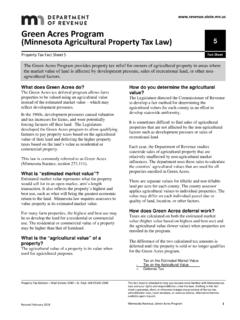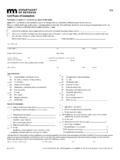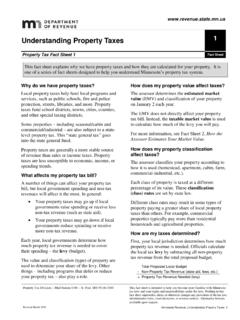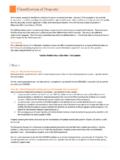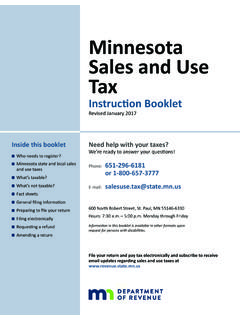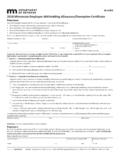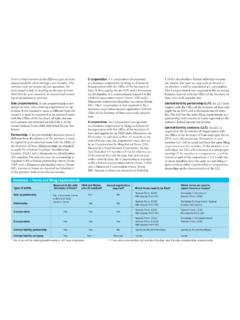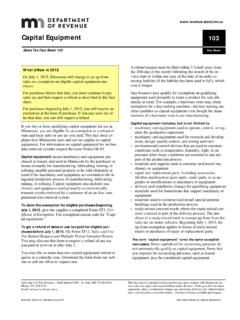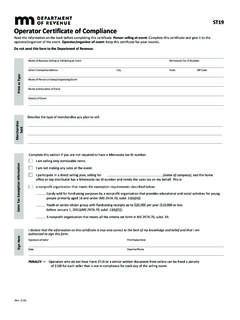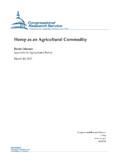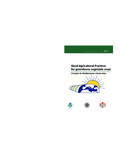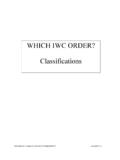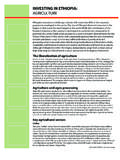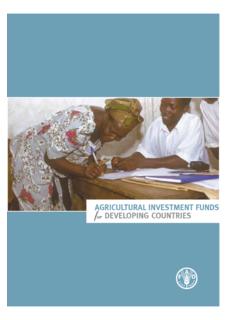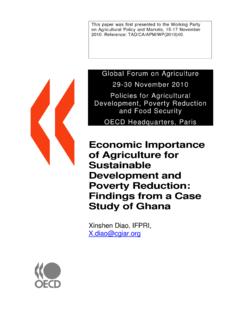Transcription of This Fact Sheet has been replaced by an Industry …
1 Sales and Use Tax Division Mail Station 6330 St. Paul, MN 55146-6330 Phone: 651-296-6181 or 1-800-657-3777 Email: This fact Sheet is intended to help you become more familiar with Minnesota tax laws and your rights and responsibilities under the laws. Nothing in this fact Sheet supersedes, alters, or otherwise changes any provisions of the tax law, administrative rules, court decisions, or revenue notices. Alternative formats available upon request. Stock No. 2800100, Revised 12/12 Minnesota Revenue, Agricultural Production Agricultural Production 100 Fact Sheet Sales Tax Fact Sheet 100 Agricultural production Agricultural production includes the following activities when they result in a product that will ultimately be sold at retail: Agriculture - cultivating soil; planting, raising and har-vesting crops; rearing, feeding and managing animals Aquaculture - cultivating plants and animals in water, including hydroponics and fish farms Floriculture - cultivating flowering plants Horticulture - cultivating fruits, vegetables and plants Maple syrup harvesting Silviculture- the care and cultivation of forest trees.
2 Agricultural production does not include processing agri-cultural products at places such as co-ops, grain eleva-tors, dairies or meat packers, or raising animals for your own use. Animals Sales and purchases of the following animals are not taxa-ble: Agricultural animals - cattle, sheep, swine, goats, poultry, honey bees, fish or any other animals raised for sale Fur-bearing animals - mink, fox, fitch, chinchilla, karakul, marten, nutria or fisher that are second gener-ation or later raised in captivity for sale Cervidae - members of the deer and elk family raised for producing fiber, meat and animal byproducts for sale or as breeding stock. Cervidae must be fenced in and registered with the Board of Animal Health. Ratitae - ostriches, emus and rheas raised for produc-ing fiber, meat and animal byproducts for sale or as breeding stock Llamas - members of the genus llama raised for pro-ducing fiber, meat and animal byproducts for sale or as breeding stock Horses - Horses and all materials such as feed, bed-ding and horseshoes used or consumed in raising, breeding and keeping horses are not taxable.
3 This in-cludes all horses, even if they are working stock or pets. Sales and purchases of animals used for research and de-velopment are not taxable. Sales and purchases of farm working stock, including mules, oxen and herd dogs, are taxable. Sales and purchases of pets are taxable. This includes farm dogs that are used for security purposes. Adoption fees for pets are taxable. Breeding Breeding stock are not taxable if the offspring will not be taxable. For example, the sale of a breeder rabbit to a per-son who sells rabbits for food is not taxable, but the sale of a breeder rabbit to a person who sells rabbits for pets is taxable. The sale of dog or cat breeding stock is always taxable since the offspring are intended to be sold as pets. Breeding and stud fees are not taxable. Artificial insemination Semen used in agricultural production is not taxable. Liq-uid nitrogen used to process agricultural semen is not tax-able. Disposable inseminating gloves and catheters are not taxable.
4 Supplies such as charts, office records, and reusable in-seminating gloves and catheters are taxable. Feed Feed, feed additives and feed supplements for agricul-tural animals are not taxable. This includes feed for pets raised for sale, farm working stock and breeding stock. Feed for agricultural animals that are raised for your own consumption is taxable, except feed for poultry is exempt if the poultry is raised for human consumption. Feed for pets is taxable. Veterinarian services Veterinarian services, drugs and medicines for agricul-tural and other nontaxable animals are not taxable. Exam-ples include calf boluses, dehorning paste, foot rot spray, mastitis tubes and terramycin powder. Medications and supplies for pets are taxable. For more information, see Fact Sheet 144, Veterinary Practice. 2 Minnesota Revenue, Agricultural Production Materials consumed in production Persons in the business of agricultural production may buy some items without paying tax.
5 This applies to items used or consumed in the production process, whether or not they become part of the product produced. Items such as feed, feed supplements, hay, and medica-tions are not taxable when purchased for agricultural ani-mals. To buy items without tax, the purchaser must give the supplier a completed Form ST3, Certificate of Exemp-tion. Chemicals Chemicals applied to fertilize agricultural crops or con-trol weeds, disease and insect infestation in agricultural crops are not taxable. Chemicals used to control or eradicate animal diseases are not taxable. This includes insecticides, pesticides and rodenticides used in the eradication of insects, predators and other pests for the health and protection of agricul-tural and other nontaxable animals. Chemicals used to clean or sanitize food processing ma-chinery or equipment are not taxable. This includes chemicals used to clean the outside of the equipment but not the surrounding work surfaces.
6 Disinfectants that are not merely additives of detergents, and are applied to agricultural and nontaxable animals or used in disinfecting their environment are not taxable. For example, disinfectants applied to dwellings to control or eradicate animal disease or pests are not taxable. Detergents or other chemicals used to clean any animal dwellings are taxable. Chemicals used for odor control are taxable. Fertilizers, herbicides and insecticides for home, garden or lawn use are taxable. Fuel and electricity agricultural facilities Fuels, electricity, gas and steam used or consumed in ag-ricultural production are not taxable. Examples include electricity used to run a milking machine or fuel used to heat a chicken brooder. Fuels, gas and electricity that are used to heat, cool, light and ventilate facilities in which agricultural animals are housed, are exempt from sales tax. Fuels, electricity, gas and steam used for general space heating, lighting farm buildings that do not house agricultural animals or to op-erate a yard light are taxable.
7 Example 1. A farmer houses swine in a confinement fa-cility and purchases utilities to heat, cool, ventilate and light the facility. The utilities can be purchased exempt from the sales tax. The exemption does not apply to space heating, cooling or lighting used or consumed in the nonproduction portions of the facility, such as office or administrative areas. Example 2. A farmer who raises dairy cattle can purchase electricity to heat, cool, ventilate and light the barn ex-empt from sales tax under the agricultural production ex-emption. The agricultural production exemption would also apply to electricity purchased to power automatic feeding systems; feed grinders; tank heaters; and milking machines, milk coolers and milker washer units. For more information, see Revenue Notice 07-01, Utili-ties Agricultural Production Animals. Fuel and electricity grain drying Fuels, electricity, gas and steam purchased by farmers for grain drying is exempt as part of the agricultural produc-tion process.
8 Beginning February 4, 2008, the Depart-ment took the position that the agricultural production process for grain continues until the grain reaches a sale-able state or until it can be acceptably commingled with other grain. Thus, fuels, electricity, gas and steam pur-chased by third parties, including grain elevator opera-tors, for grain drying also qualifies for the agricultural production exemption regardless of when title to the grain passes. Fuels, electricity, gas and steam used in the storage of grain including the aeration of grain to prevent spoilage, control insects or to reduce dust and sweating is not part of the agricultural production process and the use of fuels, electricity, gas and steam for those purposes are subject to sales tax. For more information, see Revenue Notice 08-01, Agri-cultural Production Grain Drying. Some agricultural buildings share utilities on one meter with a residential home or other non-qualifying build-ings.
9 These situations may require an energy study to de-termine the exemption percentage. For more information, see Fact Sheet 129, Utilities Used in Production. Petroleum products Fuels, lubricants and antifreeze are not taxable if they are used or consumed: in production of agricultural products, to dry grain, or to construct, maintain or repair drainage ditches, tile drainage systems, grass waterways and erosion control structures. 3 Minnesota Revenue, Agricultural Production Packaging materials Nonreturnable packaging materials (berry boxes, egg car-tons, paper bags) are not taxable. Returnable containers, such as milk cans, used to package food products are not taxable. Returnable containers used to package non-food items are taxable. Plants and seed Plants and seed used in agricultural production are not taxable. For example, seed used to grow crops for sale or as feed for agricultural animals is not taxable. Plants and seed used for home vegetable gardens, lawns or flower beds are taxable.
10 Tree seedlings purchased for windbreaks are taxable un-less they are part of a federal program, as described on page 4. Nurseries and greenhouses Nursery and greenhouse operations that grow trees, shrubs, perennials, annuals, potted plants and other plants for sale qualify for the agricultural production exemp-tions. Plants and seeds used in nursery and greenhouse produc-tion are not taxable. Temporary coverings for green-houses such as poly film, shade cloth, heat retention cloth, shade compounds, and ground cover also qualify for the agricultural production exemption. For more information, see Fact Sheet 121C, Nursery and Greenhouse Production. Machinery and equipment New and used farm machinery is exempt from sales and use tax. Repair and replacement parts for farm machin-ery, except tires, are also not taxable. Other equipment, such as trucks, trailers and storage bins that do not qualify for the exemption are taxable. For more information, see Fact Sheet 106, Farm Machin-ery.
